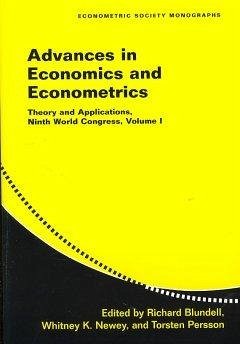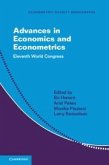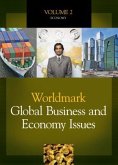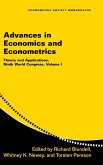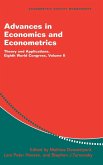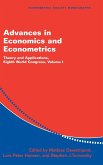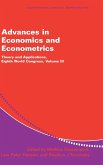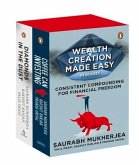Richard Blundell / Whitney Newey / Torsten Persson (eds.)Theory and Applications, Ninth World Congress
Advances in Economics and Econometrics 3 Volume Paperback Set
Theory and Applications, Ninth World Congress
Herausgeber: Blundell, Richard; Persson, Torsten; Newey, Whitney
Richard Blundell / Whitney Newey / Torsten Persson (eds.)Theory and Applications, Ninth World Congress
Advances in Economics and Econometrics 3 Volume Paperback Set
Theory and Applications, Ninth World Congress
Herausgeber: Blundell, Richard; Persson, Torsten; Newey, Whitney
- Broschiertes Buch
- Merkliste
- Auf die Merkliste
- Bewerten Bewerten
- Teilen
- Produkt teilen
- Produkterinnerung
- Produkterinnerung
This is a set of three volumes containing edited versions of papers and a commentary presented at invited symposium sessions of the Ninth World Congress of the Econometric Society, held in London in August 2005. The papers summarize and interpret key developments, and they discuss future directions for a wide variety of topics in economics and econometrics. The papers cover both theory and applications. Written by leading specialists in their fields, these volumes provide a unique survey of progress in the discipline.
Andere Kunden interessierten sich auch für
![Advances in Economics and Econometrics 2 Hardback Volume Set Advances in Economics and Econometrics 2 Hardback Volume Set]() Advances in Economics and Econometrics 2 Hardback Volume Set324,99 €
Advances in Economics and Econometrics 2 Hardback Volume Set324,99 €![Worldmark Global Business and Economy Issues: 2 Volume Set Worldmark Global Business and Economy Issues: 2 Volume Set]() Worldmark Global Business and Economy Issues: 2 Volume Set514,99 €
Worldmark Global Business and Economy Issues: 2 Volume Set514,99 €![Advances in Economics and Econometrics Advances in Economics and Econometrics]() Richard Blundell / Whitney K. Newey / Torsten Persson (eds.)Advances in Economics and Econometrics121,99 €
Richard Blundell / Whitney K. Newey / Torsten Persson (eds.)Advances in Economics and Econometrics121,99 €![Advances in Economics and Econometrics Advances in Economics and Econometrics]() Mathias Dewatripont / Lars Peter Hansen / Stephen J. Turnovsky (eds.)Advances in Economics and Econometrics136,99 €
Mathias Dewatripont / Lars Peter Hansen / Stephen J. Turnovsky (eds.)Advances in Economics and Econometrics136,99 €![Advances in Economics and Econometrics Advances in Economics and Econometrics]() Mathias Dewatripont / Lars Peter Hansen / Stephen J. Turnovsky (eds.)Advances in Economics and Econometrics92,99 €
Mathias Dewatripont / Lars Peter Hansen / Stephen J. Turnovsky (eds.)Advances in Economics and Econometrics92,99 €![Advances in Economics and Econometrics Advances in Economics and Econometrics]() Mathias Dewatripont / Lars Peter Hansen / Stephen J. Turnovsky (eds.)Advances in Economics and Econometrics72,99 €
Mathias Dewatripont / Lars Peter Hansen / Stephen J. Turnovsky (eds.)Advances in Economics and Econometrics72,99 €![Wealth Creation Made Easy in a Box Set Wealth Creation Made Easy in a Box Set]() Saurabh MukherjeaWealth Creation Made Easy in a Box Set31,99 €
Saurabh MukherjeaWealth Creation Made Easy in a Box Set31,99 €-
-
-
This is a set of three volumes containing edited versions of papers and a commentary presented at invited symposium sessions of the Ninth World Congress of the Econometric Society, held in London in August 2005. The papers summarize and interpret key developments, and they discuss future directions for a wide variety of topics in economics and econometrics. The papers cover both theory and applications. Written by leading specialists in their fields, these volumes provide a unique survey of progress in the discipline.
Hinweis: Dieser Artikel kann nur an eine deutsche Lieferadresse ausgeliefert werden.
Hinweis: Dieser Artikel kann nur an eine deutsche Lieferadresse ausgeliefert werden.
Produktdetails
- Produktdetails
- Verlag: Cambridge University Press
- Seitenzahl: 1342
- Erscheinungstermin: 2. Juli 2007
- Englisch
- Abmessung: 232mm x 154mm x 75mm
- Gewicht: 1802g
- ISBN-13: 9780521692113
- ISBN-10: 0521692113
- Artikelnr.: 22579867
- Herstellerkennzeichnung
- Libri GmbH
- Europaallee 1
- 36244 Bad Hersfeld
- gpsr@libri.de
- Verlag: Cambridge University Press
- Seitenzahl: 1342
- Erscheinungstermin: 2. Juli 2007
- Englisch
- Abmessung: 232mm x 154mm x 75mm
- Gewicht: 1802g
- ISBN-13: 9780521692113
- ISBN-10: 0521692113
- Artikelnr.: 22579867
- Herstellerkennzeichnung
- Libri GmbH
- Europaallee 1
- 36244 Bad Hersfeld
- gpsr@libri.de
Richard Blundell, CBE FBA, holds the David Ricardo Chair in Political Economy at University College London and is Research Director of the Institute for Fiscal Studies, London. He is also Director of the Economic and Social Research Council's Centre for the Microeconomic Analysis of Public Policy. Professor Blundell served as President of the Econometric Society for 2006.
Whitney K. Newey is Professor of Economics at the Massachusetts Institute of Technology. A 2000-01 Fellow at the Center for Advanced Study in the Behavioral Sciences in Palo Alto, he is Associate Editor of Econometrica and the Journal of Statistical Planning and Inference, and he formerly served as Associate Editor of Econometric Theory.
Torsten Persson is Professor and Director of the Institute for International Economic Studies at Stockholm University and Centennial Professor of Economics at the London School of Economics. He was elected a Foreign Honorary Member of the American Academy of Arts and Sciences in 2001 and served as President of the European Economic Association in 2003.
Whitney K. Newey is Professor of Economics at the Massachusetts Institute of Technology. A 2000-01 Fellow at the Center for Advanced Study in the Behavioral Sciences in Palo Alto, he is Associate Editor of Econometrica and the Journal of Statistical Planning and Inference, and he formerly served as Associate Editor of Econometric Theory.
Torsten Persson is Professor and Director of the Institute for International Economic Studies at Stockholm University and Centennial Professor of Economics at the London School of Economics. He was elected a Foreign Honorary Member of the American Academy of Arts and Sciences in 2001 and served as President of the European Economic Association in 2003.
1. The economics of social networks
2. Multi-contracting mechanism design
3. Allocative and informational externalities in auctions and related mechanisms
4. The economics of relationships
5. Information in mechanism design
6. Communication in economic mechanisms
7. Advances in dynamic optimal taxation
8. Quantitative macroeconomic models with heterogeneous agents
9. Modeling inefficient institutions
10. Whither political economy? Theories, facts, and issues
11. Comments on Acemoglu and Merlo. 1. Empirical models of auctions
2. Identification in models of oligopoly entry
3. Empirical models of imperfect competition: a discussion
4. Recent developments in the economics of Price discrimination
5. Bounded Rationality in Industrial Organization
6. Price discrimination and irrational consumers: discussion of Armstrong and Ellison
7. Behavioral economics
8. Incentives and self-control
9. Discussion of behavioral economics
10. Dynamic models for policy evaluation
11. Microeconometric search-matching models and matched employer-employee data
12. Discussion of 'dynamic models for policy evaluation' and 'microeconometric search-matching models and matched employer-employee data
13. Field experiments in development economics
14. Institutions and development: a view from below 1. Identification of non-additive structural functions Andrew Chesher
2. Non-additive models with endogenous regressors Guido W. Imbens
3. Heterogeneity and microeconomics modeling Martin Browning and Jesus Carro
4. Heterogeneous choice Rosa L. Matzkin
5. Modeling heterogeneity Arthur Lewbel
6. Inference with weak instruments Donald W. K. Andrews and James H. Stock
7. Empirical likelihood methods in econometrics: theory and practice Yuichi Kitamura
8. Weak instruments and empirical likelihood: a discussion of the papers by D. W. K. Andrews, J. H. Stock and Y. Kitamura Richard J. Smith
9. Estimating continuous-time models with discretely sampled data Yacine Aït-Sahalia
10. Variation, jumps and high frequency data in financial econometrics Ole E. Barndorff-Nielsen and Neil Shephard
11. Discussion of Aït-Sahalia and Barndorff-Nielsen and Shephard Oliver Linton and Ilze Kalnina
12. Understanding bias in nonlinear panel models: some recent developments Manuel Arellano and Jinyong Hahn
13. Fixed and random effects in nonlinear panel data model, a discussion of a paper by Manuel Arellano and Jinyong Hahn Tiemen M. Woutersen.
2. Multi-contracting mechanism design
3. Allocative and informational externalities in auctions and related mechanisms
4. The economics of relationships
5. Information in mechanism design
6. Communication in economic mechanisms
7. Advances in dynamic optimal taxation
8. Quantitative macroeconomic models with heterogeneous agents
9. Modeling inefficient institutions
10. Whither political economy? Theories, facts, and issues
11. Comments on Acemoglu and Merlo. 1. Empirical models of auctions
2. Identification in models of oligopoly entry
3. Empirical models of imperfect competition: a discussion
4. Recent developments in the economics of Price discrimination
5. Bounded Rationality in Industrial Organization
6. Price discrimination and irrational consumers: discussion of Armstrong and Ellison
7. Behavioral economics
8. Incentives and self-control
9. Discussion of behavioral economics
10. Dynamic models for policy evaluation
11. Microeconometric search-matching models and matched employer-employee data
12. Discussion of 'dynamic models for policy evaluation' and 'microeconometric search-matching models and matched employer-employee data
13. Field experiments in development economics
14. Institutions and development: a view from below 1. Identification of non-additive structural functions Andrew Chesher
2. Non-additive models with endogenous regressors Guido W. Imbens
3. Heterogeneity and microeconomics modeling Martin Browning and Jesus Carro
4. Heterogeneous choice Rosa L. Matzkin
5. Modeling heterogeneity Arthur Lewbel
6. Inference with weak instruments Donald W. K. Andrews and James H. Stock
7. Empirical likelihood methods in econometrics: theory and practice Yuichi Kitamura
8. Weak instruments and empirical likelihood: a discussion of the papers by D. W. K. Andrews, J. H. Stock and Y. Kitamura Richard J. Smith
9. Estimating continuous-time models with discretely sampled data Yacine Aït-Sahalia
10. Variation, jumps and high frequency data in financial econometrics Ole E. Barndorff-Nielsen and Neil Shephard
11. Discussion of Aït-Sahalia and Barndorff-Nielsen and Shephard Oliver Linton and Ilze Kalnina
12. Understanding bias in nonlinear panel models: some recent developments Manuel Arellano and Jinyong Hahn
13. Fixed and random effects in nonlinear panel data model, a discussion of a paper by Manuel Arellano and Jinyong Hahn Tiemen M. Woutersen.
1. The economics of social networks
2. Multi-contracting mechanism design
3. Allocative and informational externalities in auctions and related mechanisms
4. The economics of relationships
5. Information in mechanism design
6. Communication in economic mechanisms
7. Advances in dynamic optimal taxation
8. Quantitative macroeconomic models with heterogeneous agents
9. Modeling inefficient institutions
10. Whither political economy? Theories, facts, and issues
11. Comments on Acemoglu and Merlo. 1. Empirical models of auctions
2. Identification in models of oligopoly entry
3. Empirical models of imperfect competition: a discussion
4. Recent developments in the economics of Price discrimination
5. Bounded Rationality in Industrial Organization
6. Price discrimination and irrational consumers: discussion of Armstrong and Ellison
7. Behavioral economics
8. Incentives and self-control
9. Discussion of behavioral economics
10. Dynamic models for policy evaluation
11. Microeconometric search-matching models and matched employer-employee data
12. Discussion of 'dynamic models for policy evaluation' and 'microeconometric search-matching models and matched employer-employee data
13. Field experiments in development economics
14. Institutions and development: a view from below 1. Identification of non-additive structural functions Andrew Chesher
2. Non-additive models with endogenous regressors Guido W. Imbens
3. Heterogeneity and microeconomics modeling Martin Browning and Jesus Carro
4. Heterogeneous choice Rosa L. Matzkin
5. Modeling heterogeneity Arthur Lewbel
6. Inference with weak instruments Donald W. K. Andrews and James H. Stock
7. Empirical likelihood methods in econometrics: theory and practice Yuichi Kitamura
8. Weak instruments and empirical likelihood: a discussion of the papers by D. W. K. Andrews, J. H. Stock and Y. Kitamura Richard J. Smith
9. Estimating continuous-time models with discretely sampled data Yacine Aït-Sahalia
10. Variation, jumps and high frequency data in financial econometrics Ole E. Barndorff-Nielsen and Neil Shephard
11. Discussion of Aït-Sahalia and Barndorff-Nielsen and Shephard Oliver Linton and Ilze Kalnina
12. Understanding bias in nonlinear panel models: some recent developments Manuel Arellano and Jinyong Hahn
13. Fixed and random effects in nonlinear panel data model, a discussion of a paper by Manuel Arellano and Jinyong Hahn Tiemen M. Woutersen.
2. Multi-contracting mechanism design
3. Allocative and informational externalities in auctions and related mechanisms
4. The economics of relationships
5. Information in mechanism design
6. Communication in economic mechanisms
7. Advances in dynamic optimal taxation
8. Quantitative macroeconomic models with heterogeneous agents
9. Modeling inefficient institutions
10. Whither political economy? Theories, facts, and issues
11. Comments on Acemoglu and Merlo. 1. Empirical models of auctions
2. Identification in models of oligopoly entry
3. Empirical models of imperfect competition: a discussion
4. Recent developments in the economics of Price discrimination
5. Bounded Rationality in Industrial Organization
6. Price discrimination and irrational consumers: discussion of Armstrong and Ellison
7. Behavioral economics
8. Incentives and self-control
9. Discussion of behavioral economics
10. Dynamic models for policy evaluation
11. Microeconometric search-matching models and matched employer-employee data
12. Discussion of 'dynamic models for policy evaluation' and 'microeconometric search-matching models and matched employer-employee data
13. Field experiments in development economics
14. Institutions and development: a view from below 1. Identification of non-additive structural functions Andrew Chesher
2. Non-additive models with endogenous regressors Guido W. Imbens
3. Heterogeneity and microeconomics modeling Martin Browning and Jesus Carro
4. Heterogeneous choice Rosa L. Matzkin
5. Modeling heterogeneity Arthur Lewbel
6. Inference with weak instruments Donald W. K. Andrews and James H. Stock
7. Empirical likelihood methods in econometrics: theory and practice Yuichi Kitamura
8. Weak instruments and empirical likelihood: a discussion of the papers by D. W. K. Andrews, J. H. Stock and Y. Kitamura Richard J. Smith
9. Estimating continuous-time models with discretely sampled data Yacine Aït-Sahalia
10. Variation, jumps and high frequency data in financial econometrics Ole E. Barndorff-Nielsen and Neil Shephard
11. Discussion of Aït-Sahalia and Barndorff-Nielsen and Shephard Oliver Linton and Ilze Kalnina
12. Understanding bias in nonlinear panel models: some recent developments Manuel Arellano and Jinyong Hahn
13. Fixed and random effects in nonlinear panel data model, a discussion of a paper by Manuel Arellano and Jinyong Hahn Tiemen M. Woutersen.

